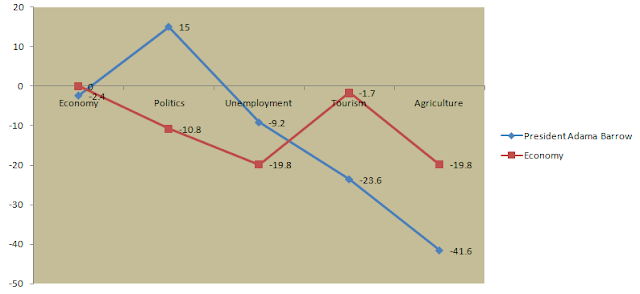The
Gambia is a country of over 2 million people in West Africa. Amid positive and
negative forces
shaping the country’s economy, Gambians sought information about President
Adama Barrow because socio-economic
situation remains President Barrow’s main challenge after former President
Yahya Jammeh’s departure.
Unemployment, inflation
rates and debt to the Gross Domestic Product are on the rise since 2017. Unemployment rate is
9.50% for the current quarter. This is expected to dip to 9.40% at the end of
third and fourth quarters in 2018 and maintain 9% rate from first quarter of
2019 till second quarter of the same year.
In 2017, the
country’s GDP growth rebounded to an estimated 5.1% after erratic and
spillover effects of the regional Ebola crisis that dissipated GDP growth from
5.6% to -0.2% in 2014, driven
primarily by agriculture and services, and is projected to stabilize around 4%
over the medium-term, depending on the new administration’s ability to conduct
a robust transition, attract investors, and lay the foundations for economic
transformation.
Gambians want the new
President to solve some of the problems if not all using his capacity, internal
and external resources. Infoprations’ analysis of the President’s popularity in
the virtual sphere reveals that Gambians’ interest in President Barrow linked
with the economy, unemployment, tourism and agriculture negatively. This is an
indication that the citizens expect the concrete solutions to the
socio-economic challenges. Analysis further reveals that President Barrow’s
popularity moved in positive direction with the country’s political atmosphere,
signifying acceptance of his political leadership since he took over from the
former President Jammeh.
When Infoprations analysed President Barrow’s
popularity within the country’s rankings in the 2018’s Global Competitiveness
Index, analysis shows that President needs to work on efficiency of government spending,
transparency of his government while making policies. President equally needs
to create enabling environment for proper accountability on the part of the
public and civil servants, and for business sophistication. These have propensity
of solving agricultural, tourism and unemployment issues, analysis suggests.


Comments
Post a Comment